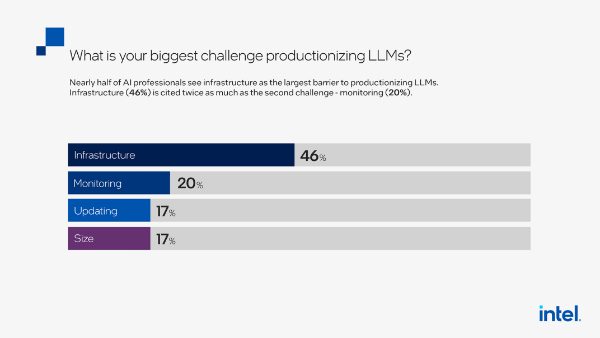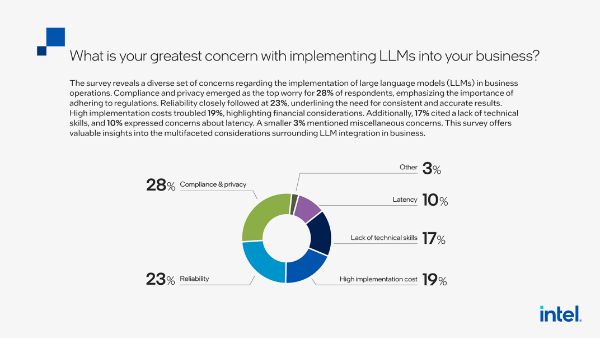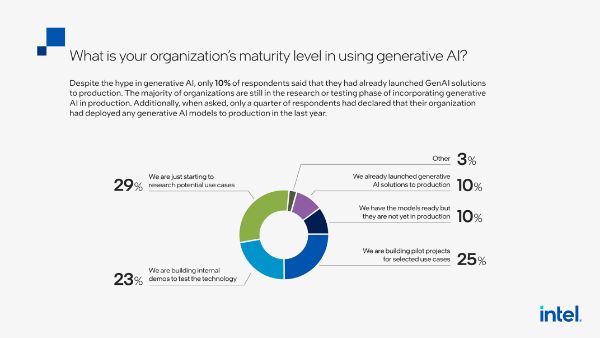TL;DR:
- cnvrg.io releases its 2023 ML Insider survey results on GenAI adoption.
- Despite industry interest, most organizations have not embraced Generative AI (GenAI) technology.
- The survey highlights the low adoption of Large Language Models (LLMs) within organizations.
- U.S.-based organizations show higher GenAI adoption rates.
- Benefits of GenAI adoption include improved customer experiences, efficiency, product capabilities, and cost savings.
- Key barriers to GenAI adoption include infrastructure, knowledge gaps, cost, and compliance.
- Intel’s hardware and software, including cnvrg.io, offer flexibility and cost-effectiveness for GenAI implementation.
Main AI News:
In the realm of artificial intelligence and machine learning, 2023 has been a year of remarkable developments. cnvrg.io, an Intel company specializing in AI and Large Language Model (LLM) platforms, has recently unveiled the findings of its highly anticipated 2023 ML Insider survey. This annual survey, now in its third iteration, delves into the world of machine learning, shedding light on trends, challenges, and points of interest that AI professionals grapple with daily.
Despite the fervent enthusiasm surrounding AI across various industries, the survey has unveiled an intriguing paradox – while interest in AI is soaring, the majority of organizations are yet to harness the potential of Generative AI (GenAI) technology. GenAI, still in its nascent stages, has been the buzzword of 2023. The survey underscores that organizations might be hesitating to embrace GenAI due to the perceived obstacles in implementing Large Language Models (LLMs).
Markus Flierl, Corporate Vice President and General Manager of Intel Cloud Services, observes, “With the advent of cost-effective infrastructure and services, exemplified by cnvrg.io and the Intel Developer Cloud, we anticipate a surge in GenAI adoption in the coming year. This will be attributed to the simplification of fine-tuning, customization, and deployment of existing LLMs, all without the need for specialized AI expertise.”
Despite the growing GenAI awareness, it remains a niche within the broader AI landscape. The survey reveals that a substantial portion of organizations have yet to deploy GenAI models in production settings. A mere 10% of respondents reported successful GenAI solutions launch within the past year. Interestingly, the survey highlights a stark difference in GenAI adoption between U.S.-based (40%) and international (22%) respondents, with the former exhibiting greater enthusiasm.
For organizations that have embraced GenAI, there are tangible benefits to be reaped. Improved customer experiences (58%), increased efficiency (53%), enhanced product capabilities (52%), and cost savings (47%) are among the advantages cited by survey participants.

Source: Scoop
However, the study also sheds light on the challenges hampering GenAI adoption. A significant proportion of organizations opt for the route of building custom LLM solutions tailored to their specific use cases. Yet, nearly half of respondents (46%) identify infrastructure as the primary hurdle in LLM product development.
The survey illuminates other obstacles contributing to the sluggish adoption of LLM technology, including knowledge gaps, cost constraints, and compliance concerns. A striking 84% of respondents admit to the need for skill improvement in response to the growing interest in LLM adoption. Astonishingly, only 19% claim to possess a strong grasp of LLM response generation mechanisms.
This knowledge gap is a potential roadblock to GenAI adoption, mirroring organizations’ struggles with complexity and the shortage of AI talent, which are identified as the foremost barriers to AI acceptance. Furthermore, respondents express concerns about compliance and privacy (28%), reliability (23%), high implementation costs (19%), and a scarcity of technical skills (17%) when contemplating LLM integration into their operations. Infrastructure, once again, emerges as a significant hurdle to the production integration of LLMs, cited by nearly half of respondents.
Nonetheless, the impact of GenAI on the industry is undeniable. In comparison to 2022, the utilization of chatbots/virtual agents has surged by 26%, while translation/text generation has risen by 12% in 2023, establishing themselves as popular AI applications. This growth can be attributed to the increasing prominence of LLM technology and advancements in GenAI. Organizations that have successfully embraced GenAI in the past year report substantial benefits, including improved customer experiences (27%), enhanced efficiency (25%), increased product capabilities (25%), and cost savings (22%).
Intel, with its comprehensive hardware and software portfolio, including cnvrg.io, offers customers unparalleled flexibility and choice in crafting optimal AI solutions tailored to their performance, efficiency, and cost targets. By streamlining the deployment of large language models on Intel’s purpose-built hardware, cnvrg.io empowers organizations to enhance their products with GenAI and LLMs in a cost-effective manner. In an era marked by exponential growth and the omnipresence of AI, Intel stands as the sole entity equipped to provide open and modular solutions, enabling organizations to thrive.




Source: Scoop
Conclusion:
The 2023 ML Insider survey underscores the slow adoption of Generative AI (GenAI) technology, despite its buzz in the industry. While the U.S. leads in GenAI deployment, challenges like infrastructure, knowledge gaps, and compliance concerns are hindering broader adoption. However, early adopters are reaping benefits like improved customer experiences. The growth of chatbots and text generation suggests GenAI’s increasing importance, and with Intel and cnvrg.io’s solutions, there’s a promise for a more accessible GenAI landscape.

